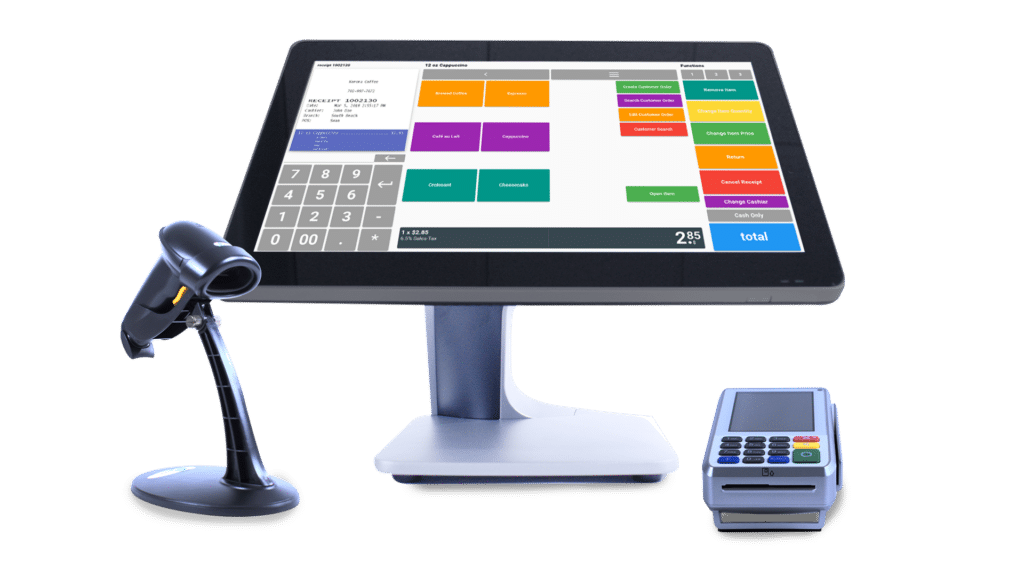One of the most critical tools for maintaining inventory visibility is the stock keeping unit (SKU) number—a unique identifier that helps retailers ensure smooth operations, from stocking to selling.
In this post, we’ll dive into everything you need to know about SKU numbers: how they work, how to create them, how they compare to UPCs and serial numbers, and why they’re essential to retail success. Let’s break it all down.
💡 Key Takeaways:
- Stock Keeping Unit (SKU) numbers are unique alphanumeric codes that help businesses identify, track, and manage inventory effectively.
- Creating a functional SKU system improves inventory management, forecasting, and sales strategies.
- Tools like KORONA POS make SKU creation and inventory management intuitive and scalable for retailers of all sizes.
What Are SKU Numbers?
A SKU (Stock Keeping Unit) number is a unique alphanumeric code assigned to each product in your inventory. It’s designed to help businesses track and differentiate items based on characteristics like size, color, style, and price.
Unlike UPCs or serial numbers, SKUs are internally generated and customizable, which gives businesses flexibility in organization.
How SKU Numbers Work in a Business
SKU numbers help businesses:
- Identify products quickly in POS systems.
- Organize warehouse storage more efficiently.
- Monitor sales trends based on size, color, or variant.
- Manage reordering by tracking what’s selling and what’s not.
They are usually used with barcode POS systems that allow for fast scanning and data input.
Where to Get SKU Numbers
You don’t need to buy SKU numbers—they’re created internally. Your POS system or inventory management software should allow you to generate and assign SKUs based on product attributes.
If you’re using KORONA POS, you can automate SKU generation or customize each SKU based on your preferred naming structure.
Comparing SKUs with Other Retail Coding Systems
SKU numbers are internal identifiers created by retailers, while UPCs, serial numbers, and barcodes serve different functions. UPCs are universal product codes used across retailers, serial numbers track individual items, and barcodes visually represent data.
Each system plays a unique role in product identification and inventory management. Here’s how SKU numbers stack up against UPCs, serial numbers, and barcodes:
Code Type | Description | Who Creates It | Example |
SKUs | Internal product ID for tracking inventory | You (the retailer) | SR-WR-RD-08 |
UPCs | Universal product code used for scanning at checkout | GS1 (external org) | 012345678905 |
Serial Numbers | Unique to each individual item; used for warranties or service tracking | Manufacturer | SN1234567890 |
Barcodes | Machine-readable version of a SKU or UPC | Derived from code |
Benefits of Using SKU Numbers for Businesses
The benefits of using SKU numbers are aplenty. Here are some of our favorites:
📦 Track Inventory
SKU numbers provide a systemized way to monitor your inventory levels across multiple locations and spot real-time discrepancies.
🔮 Predict Future Sales
By analyzing which SKUs are performing well, you can forecast demand and stock more accurately.
Pro Tip:
With ABC retail analysis, retailers can see exactly how each item by SKU is performing.
🛒 Optimize Ordering
Keep shelves stocked with high-performing items while phasing out products that don’t sell.
💡 Product Recommendations
Link related SKUs to help your POS system suggest add-ons and increase average transaction value.
💰 Set Pricing Variations
Easily track and manage price changes across sizes, colors, or product bundles.
😊 Improve Customer Experience
SKUs help speed up returns, exchanges, and refunds by making product lookup quick and reliable.
📋 Streamline Audits
With SKU reports, inventory audits become less time-intensive and much more precise.
Inventory management a headache?
KORONA POS makes stock control easy. Automate tasks, generate custom reports, and learn how you can start improving your business.
How to Create SKU Numbers for Your Business
With KORONA POS, making SKUs easy and customizable. Users are able to create SKUs in different ways for different purposes:
Step #1: Choose a Naming Convention
Start with a logical structure based on product categories. This makes your SKUs easy to read and scale.
Pro Tip:
- One example of an SKU structure is [Category]-[Color]-[Size]. A smoke shop‘s SKU for large-sized, gold rolling papers might be RO-GOLD-L.
Step #2: Keep Them Short But Informative
In general, avoid using unnecessary characters. Definitely refrain from using symbols or spaces, as they can cause errors in databases. Stick to alphanumeric codes and keep them under 12 characters when possible.
Step #3: Use Your POS System
KORONA POS simplifies the SKU creation process, prevents duplicate codes, and makes inventory management easier than ever. Therefore, retailers can enjoy precise ordering, instant pricing updates, and an ever-refreshed inventory.
KORONA POS has been a huge game changer for my overall profitability. Implementation was seamless and painless! The support staff is great and always ready to help. Had I known it would be this easy, I would have made the switch sooner!
-Kristen L.
Best Practices for Managing SKUs
It’s crucial to manage your SKUs with purpose and accuracy. Otherwise, you risk creating an even more confusing inventory management situation, and no retailer wants that. Here are the top three ways to manage SKUs:
Practice #1: Don’t Reuse SKUs
Even if an item is discontinued, its SKU should be retired to avoid confusion in future audits or reports.
Practice #2: Standardize Across Channels
Ensure the same SKU is used across online and in-store platforms to unify reporting. The best inventory management systems will make this simple.
Practice #3: Audit Regularly
Conduct monthly inventory checks using SKU-level reporting. See our inventory reporting guide for help.
Examples of SKU Numbers by Industry
SKUs look unique for each industry and shopkeeper. They should strategically identify products based on what a retailer sells. Here’s how SKUs might differ across sectors:
Example #1: Apparel
In the apparel industry, SKUs typically reflect product type, target demographic, color, and size. This structure ensures retailers can easily manage styles and variations like gender or seasonal colors.
👕 APPAREL SKU Example:
TS-WM-BL-L = T-shirt, women’s, blue, large.
Example #2: Grocery
Grocery SKUs tend to encode product type, attributes like organic or conventional, and package size. This allows quick tracking of perishable goods, promotions, and restocking needs.
🛒 GROCERY SKU EXAMPLE:
AP-ORG-3LB = Apples, organic, 3 lbs.
Example #3: Electronics
Electronics SKUs frequently include the item type, capacity or specs, and color. This helps distinguish between nearly identical products with different storage options or finishes for tech-savvy consumers.
💻 Electronics sku example:
HD-1TB-BLK = Hard drive, 1TB, black.

How KORONA POS Helps Manage SKUs
KORONA POS helps you design SKU formats, generate them automatically, and manage inventory seamlessly—whether you sell online, in-store, or both. With built-in reporting, you’ll see SKU-level trends that can inform smarter business decisions.

Speak with a product specialist to learn exactly what you need and how we can help.














